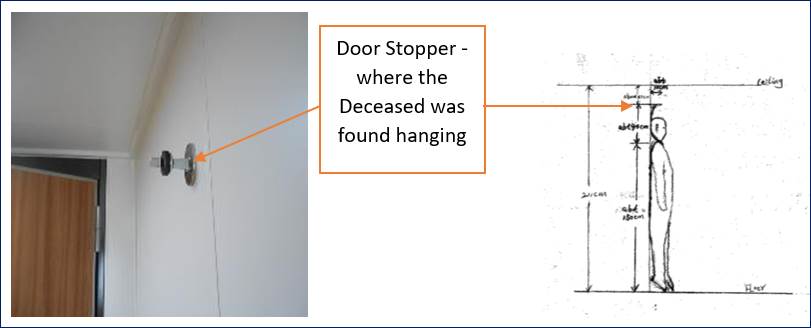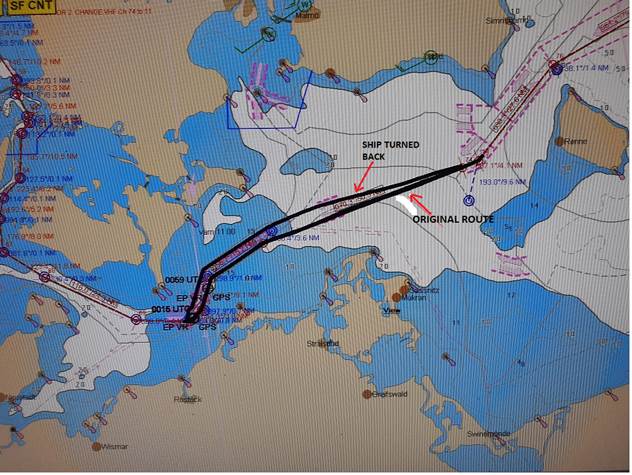The recently published 'SHI' highlighted that the happiness levels amongst seafarers onboard has increased gradually and this is a good indication that shipowners and managers are taking the right steps to care for seafarers' mental wellbeing.

Findings – Extension of the Seafarer's Employment Agreements (SEAs)
Despite this positive result, the responses highlighted concerns of working onboard for an extended period, with many employers requiring seafarers to sign extended SEAs – on the premise that crew change cannot be carried out. Shipowners and managers should note that extended periods on board may lead to poor mental well-being, increased fatigue, and increase in interpersonal tensions.
Shipowners and managers should also note that extension of SEAs should only be used as a last resort and with the documented consent of the seafarer. The shipowner and manager should make every effort to repatriate the crew in the first available port once the initial SEA has expired.

In the event that an extension is signed, the master and all seafarers should be vigilant for signs of unsafe and unsound behaviour, increased fatigue and decreased cognitive well-being. Shipowners and managers are also reminded that it is a violation under the International Labour Organization (ILO), enacted under the Singapore's Merchant Shipping (Maritime Labour Convention) Act, for seafarers without a valid SEA to continue to be engaged on board ships, or if the total sea service of the seafarer exceeds the maximum duration (maximum 11 months taking into account the requirement for seafarer to consume earned annual leave). Companies extending the crew's SEA beyond the 11th month must write to the Seafarers Management Department (SMD) at mmo_mpa@mpa.gov.sg to seek a flag's approval for extension, where approvals are granted only on a case by case basis.
Findings – External Issues
The report also highlighted that seafarers continue to face many stressors onboard, with several seafarers speaking of bullying, harassment, and even xenophobia and racism on board. These stressors cause poor mental well-being which would in turn impact performance.
Case Study 1: Unnatural Death at Sea
A Singapore-registered ship was anchored and waiting for orders when an unnatural death occurred on board.
In the evening of 28 February 2021, when repeated calls to the crew went unanswered, the Master asked the Bosun to knock on the cabin door of the crew. When the crew did not respond to the knocking on his door, the Bosun called the Master. Using his master-key, the Master then unlocked the cabin and was horrified to see the crew hanging with a rope on his neck.

Findings
The Deceased was a 57 years old seafarer of slim built and medium height; and certified fit for sea service. He had been with the Company since 1999 and had risen through the ranks. He was a loyal crew, was of reserved character and he got along well with the other crew on board.
The ship had not performed any voyage for many months and the Deceased was given mainly routine maintenance work and anti-piracy watchkeeping duties. The Deceased was rostered to keep security watch from 2000-2400.
On 24 February 2021, the Deceased confided to the Master his worries about his two unmarried sons having difficulty buying a house due to the high cost of living.
On 28 February 2021, the Deceased performed routine testing of the deck cranes with the Bosun. Then, he was last seen having dinner with the Bosun at around 5PM.
Throughout his tenure, the Deceased did not exhibit any alarming signs or symptoms which warrant special attention, other than his expression of stress and worry about his two unmarried sons.
The Deceased was said to have been a reserved character. This alluded to the possibility that not much else may have been known to the rest of the crew if the Deceased had succumbed to other mental or emotional problems. When asked by the Master and Chief Officer, the Deceased had always replied that he was generally well.
Lessons Learnt
Seafarer's mental health and well-being is especially important during the Covid-19 pandemic. Family or financial problem can be a serious issue which unfortunately may or may not give any indication of some untoward incidents.
With regards to the overall health and well-being of the crew, it is important that all stakeholders (including the officers and crew on board) are made aware of the importance of seafarers' mental health. Close vigilance and monitoring especially by the Senior Officers (Master, Chief Engineer, Chief Officer and Second Engineer) for any tell-tale signs and timely counselling or intervention may prevent the situation from deteriorating further.
Case Study 2: Seaman Missing at Sea
A Singapore-registered general cargo ship was underway and bound for Latvia, when one of the crew members was found missing.
On the morning of 23 July 2020, the Seaman did not turn up for work as expected. Upon conducting a search on board, it was concluded that the Seaman was missing. As the ship was in Danish territorial waters, the Master informed the Danish authorities and turned the ship around to the estimated position when the Seaman was last seen (see figure below).

Findings
The missing Seaman was a 48-year-old , who was certified fit for sea service. He had been with the Company for about 5 years and had a clean record of service. He was someone of reserved character but got along generally well with the other crew on board.
The Seaman was assigned deck work during the day and assisted in watchkeeping during hours of 2000-2400hrs at night.
Shortly after the Seaman had joined the ship on 12 June 2020, he requested medication for high blood pressure from the Master. During the period that followed, he also complained of insomnia and panic attacks.
Due to the Seaman's overall situation, the Master continued to check on his condition daily.
On 20 July 2020, the Seaman requested to be signed off and repatriated. The Seaman provided an official letter for this and cited the insomnia and panic attacks as reasons for his request. The company acceded to the request and the Seaman was due to sign off at the next port.
The Seaman was last seen on the night of 22 July 2020. Until then, he had always replied to the Master that he was generally well. In the light of his condition, he was assigned light duties.
Upon the discovery and the report that the Seaman was missing, the Danish authorities conducted a search and rescue operation. The search was concluded on the same night without any success.
On 08 August 2020, the company received a police report that a male body was found, which was subsequently identified as the missing Seaman.
Lessons Learnt
The Seaman's latest personal medical report certified him as being fit for service on board and did not contain any remarks to the contrary. Having been a generally reserved person, not much was known about the Seaman's personal and family life. However, the statement of one of the fellow crew members suggested that some family problems may have existed.
The overall health and well-being of the crew on board is important and should not be overlooked by the company and stakeholders ashore. Since medical reports do not reflect such conditions, close monitoring for signs with early intervention and proper counselling can help to prevent a situation from deteriorating.
MPA stresses the importance of the mental health of seafarers should be addressed via dialogues with shipping companies and other fora as deemed appropriate.
Shipowners and managers are encouraged to keep regular contact with the crew onboard to support individuals according to their needs and solutions, rather than taking a one-size-fits-all approach. Cultural norms in terms of dealing with stress as well as the specific situation in the seafarers' home country should also be considered.

On performance, the report labelled the workload onboard as a key issue, particularly in relation to paperwork and working hours. It is mentioned from a number of respondents that rest hours are not being complied with, and they stated concerns about an endemic and systemic culture of fraud. This issue was also earlier confirmed by a study by the World Maritime University (WMU) which confirmed a “widespread” discrepancy in MLC hours of work and rest reporting onboard.
Lessons Learnt
Shipowners and managers should be reminded that it is important for work and rest reporting to be factual and accord seafarers working onboard with the rest hours based on the amount they had worked. Falsifying records onboard are punishable and detainable offences, and companies must take their utmost efforts to ensure such 'endemic and systemtic culture of fraud' do not happen on vessels managed by them.
Shipowners may also consider improving the welfare onboard by, amongst other things:
- Promoting a work-life balance culture on board;
- Providing a means to connect with friends and family ashore (e.g. internet access);
- Engaging more with all crew onboard to find their onboard situation; and
- Providing access to better recreational facilities onboard.

To end this article on a more positive note, the SHI report also indicated some positive changes observed and we encourage shipowners and managers to keep up the good effort. The positive changes observed are:
- Connectivity – it is reported that more seafarers can get online and connect with friends, family and loved ones ashore; and
- Recreation – it is reported that there are improvements in non-work environment onboard, from gyms to table tennis, game consoles and video on demand.
Recommendations
Towards this end MPA recommends the following websites, amongst others, for further reading to awaken awareness on mental wellness: -
- Seafarerwelfare.org;
- Guidelines for mental care on board Merchant ships – https://www.shipownersclub.com
- Seafarers' mental health and well-being – https://www.gard.no
- How mental health issues affect seafarers – https://safety4sea.com
- Seafarer mental health: lessons learnt from the Covid-19 pandemic – https://ship-technology.com
An example of Life skills for emotional health is the “Wise Mind ACCEPTS” (Dr. Marsha Linehan) which provide 7 Dialectic Behavioural Therapy Skills for relief: -
| A | Activities | Engaging in an activity helps to distract from the intensity of the emotion and offers short-term relief. |
| C | Contributing | One way to unglue from being wrapped up in the intensity of negative emotion is to contribute to something outside of one's self. Doing this re-directs the intense energy to something productive. |
| C | Comparisons | Take a moment to reflect on things that one has that others may not have. Keeping a daily gratitude journal helps one to refocus when feeling negative. “It is what it is. I know it is hard. And it will definitely pass”. |
| E | Emotions (opposite) | Choosing to act in a completely opposite emotion can be a powerful tool. The goal of opposite action is not just to shift the current emotions but more importantly to remind oneself that all emotional states are temporary. |
| P | Pushing Away | Pushing Away is a visualisation technique to push away whatever uncomfortable emotions one is experiencing. |
| T | Thoughts | Cognitive thoughts can give short-term relief when overwhelmed by negative emotions. For example, reading a book and shifting full attention to the reading may shift one's emotional state. |
| S | Sensations | Sensations provide temporary sensory distractions. Examples include – (a) holding ice cubes in one's hands for 30-60 seconds, (b) putting ice pack on one's forehead, (c) taking a cold or hot bath, (d) eating one's favourite food. Become mindful of how the pleasant physical sensations can provide short-term relief and distract one from choosing to do self-harm. |
